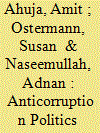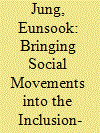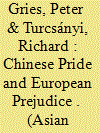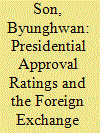|
|
|
Sort Order |
|
|
|
Items / Page
|
|
|
|
|
|
|
| Srl | Item |
| 1 |
ID:
181397


|
|
|
|
|
| Summary/Abstract |
Eliminating corruption is seen as a practice that supports democratic governance. We argue, however, that particular anticorruption politics in contemporary India can damage the project of democratic deepening, because elites often deploy these politics against the representation of the marginalized. Anticorruption politics can subvert democratic deepening by challenging as corrupt the means by which the parties of the marginalized mobilize resources to compete in elections and by selectively targeting lower-caste political leaders for indictment on corruption charges within an overall discriminatory politics of deservedness. Anticorruption governance by parties in power seriously hinders the provision of welfare to the poor because of the technocratic and centralizing character of the governance reforms. We argue overall that while corruption is indeed damaging to democracy, elite anticorruption politics can also represent a significant barrier to democratic deepening and welfare.
|
|
|
|
|
|
|
|
|
|
|
|
|
|
|
|
| 2 |
ID:
181396


|
|
|
|
|
| Summary/Abstract |
Many scholars argue that democracy tames religious fundamentalism. This inclusion-moderation theory holds that when radical religious movements are incorporated in the democratic system, they have incentives to adhere to institutional frameworks to influence politics and access power. But despite these claims, we have witnessed a growing influence of religious fundamentalism in Asian democratic politics, with immoderation becoming prominent. Why have religious fundamentalist movements become influential in various democracies in Asia? How have they shaped policies? Using a most-different-systems approach, I investigate religious fundamentalism in two dissimilar democracies: Islamic fundamentalism in Indonesia and Christian fundamentalism in South Korea. In both cases, I argue that religious fundamentalist movements facilitate immoderate politics through strong mobilization capacity, agenda-setting power, and framing. The study contributes to the inclusion-moderation literature through its discussion of religious fundamentalism and its cross-religious comparison.
|
|
|
|
|
|
|
|
|
|
|
|
|
|
|
|
| 3 |
ID:
181394


|
|
|
|
|
| Summary/Abstract |
The Chinese government’s cover-up of the origins of the new coronavirus, and its more openly prideful and aggressive foreign and human rights policies, triggered a dramatic deterioration of foreign views of China in 2020. That year also witnessed a significant increase in anti-Chinese/Asian prejudice around the world. Could the former have shaped the latter? Drawing on theories of prejudice and ideology, and using an Autumn 2020 13-nation European survey about China, this paper explores whether increasingly negative attitudes toward Chinese government policies prejudiced European views of local Chinese students, tourists, and communities. It finds substantial evidence of a spillover effect, an effect which is stronger among conservative Europeans than among progressive Europeans more motivated to avoid prejudice. The paper concludes with thoughts on the danger that China’s prideful “wolf warriors” pose for Chinese students, tourists, and local Chinese communities confronting prejudice in Europe today.
|
|
|
|
|
|
|
|
|
|
|
|
|
|
|
|
| 4 |
ID:
181393


|
|
|
|
|
| Summary/Abstract |
There has been a debate on how the state-driven anticorruption movement during the Xi Jinping administration has influenced state-owned enterprises (SOEs). Research has examined the relationship between corruption and economic development at the country level in Asia and has found paradoxically that economic growth and high corruption levels can coexist. However, the “Asian paradox” that appears at the country level may be a transitional phenomenon of the short term. Not many researchers have empirically compared individual firm-level performance before and after a strong anticorruption drive, drawing on relevant comparison groups. This study tests whether Xi’s 2012 anticorruption campaign improved SOEs’ performance. With a difference-in-differences method, it explores whether the anticorruption campaign had different effects on the financial performance of SOEs and non-SOEs (private companies). We find that the anticorruption initiative improved SOEs’ financial performance and benefited SOEs more than non-SOEs.
|
|
|
|
|
|
|
|
|
|
|
|
|
|
|
|
| 5 |
ID:
181395


|
|
|
|
|
| Summary/Abstract |
Do presidential approval ratings affect exchange rates? The empirical purview of the vast literature on this topic has been confined to the run-up to elections. The importance of approval ratings in non-election periods has therefore been under-studied. Examining daily data on the exchange rate of the Korean won during the presidency of Park Geun Hye, we find that the won weakened (1) when Park’s ratings were low and (2) when they bounced back unexpectedly from a low level. This finding explains why Park’s impeachment did not lead to a serious panic in the won market. It seems that well before the impeachment, the exchange rate already reflected the market’s concerns about the uncertainty in the government.
|
|
|
|
|
|
|
|
|
|
|
|
|
|
|
|
| 6 |
ID:
181398


|
|
|
|
|
| Summary/Abstract |
Can contemporary liberal states formulate and pursue a “liberal” immigration control policy? Set against the backdrop of the experience of immigrant-receiving Western liberal democracies, this article examines this question by focusing on Japan. Its main objective is to map the under-studied case of Asia’s most liberal democracy, which is conventionally associated with an “at best illiberal” stance on immigration. I contend, first, that liberal immigration control policy is inevitably defined by approximation, and second, that Japanese policy outputs have become, albeit to varying degrees, more liberal in three fundamental domains of immigration control: the admission policy is increasingly open and unambiguous; the selection policy is gradually being racially decentered; and the removal policy is more attuned to migrants’ rights. However, this case also demonstrates that such an evolution generates inconsistencies across, and tensions within, the different policy domains, which underscores the contemporary liberal state’s general incoherence on immigration affairs.
|
|
|
|
|
|
|
|
|
|
|
|
|
|
|
|
|
|
|
|
|